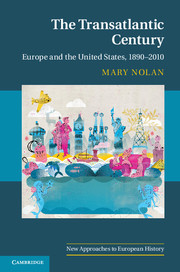Book contents
- Frontmatter
- Contents
- Illustrations
- Maps
- Tables
- Acknowledgments
- Introduction
- 1 An uncertain balance, 1890–1914
- 2 World War I: European crisis and American opportunity
- 3 Ambivalent engagement
- 4 The depression and transatlantic new deals
- 5 Strange affinities, new enemies
- 6 From world war to Cold War
- 7 Cooperation, competition, containment
- 8 Culture wars
- 9 The American Century erodes, 1968–1979
- 10 Renewed conflict and surprising collapse
- 11 A widening Atlantic
- 12 Imperial America, estranged Europe
- Suggested readings
- Index
- References
2 - World War I: European crisis and American opportunity
Published online by Cambridge University Press: 05 November 2012
- Frontmatter
- Contents
- Illustrations
- Maps
- Tables
- Acknowledgments
- Introduction
- 1 An uncertain balance, 1890–1914
- 2 World War I: European crisis and American opportunity
- 3 Ambivalent engagement
- 4 The depression and transatlantic new deals
- 5 Strange affinities, new enemies
- 6 From world war to Cold War
- 7 Cooperation, competition, containment
- 8 Culture wars
- 9 The American Century erodes, 1968–1979
- 10 Renewed conflict and surprising collapse
- 11 A widening Atlantic
- 12 Imperial America, estranged Europe
- Suggested readings
- Index
- References
Summary
In August 1914 war engulfed the European continent. Each belligerent anticipated a quick and glorious end to hostilities but instead experienced four years of brutal, mechanized warfare that required total mobilization of the home front. When the troops returned from the battlefields in late 1918, they found their prewar worlds profoundly shaken. In the wake of war and contentious peace negotiations, old empires collapsed, new nation-states and fledgling democracies emerged, and colonial possessions were reshuffled. Among victors and vanquished alike, economies lay in tatters, traditional gender norms were in disarray, and social conflicts and revolutionary upheavals spread over Russia, Germany, Italy, Austria, Hungary, and Britain. The war, which killed, injured, and psychologically maimed millions of soldiers, began what many have called the Thirty Years War of the twentieth century. Europeans experienced and remembered the war as a horrific trauma, which destroyed lives, states, economies, and ways of life and began an extended period of conflict, loss of confidence, and decline.
For America, the war had a quite different meaning. Although essentially a European conflict, the Great War, as it was then called, offered the United States the opportunity to intervene economically and militarily and the prospect of rescuing and reforming Europe politically. It also presented the danger of entangling alliances. The United States attained a new kind of presence in Europe, while enjoying economic prosperity and suffering comparatively few social conflicts and military losses. Some Americans came to see the United States as Europe’s savior, guide, and sole bulwark against Bolshevism; Europeans, however, sought to chart their own course, and many Americans were ambivalent about assuming new European and global roles.
- Type
- Chapter
- Information
- The Transatlantic CenturyEurope and America, 1890–2010, pp. 52 - 75Publisher: Cambridge University PressPrint publication year: 2012



